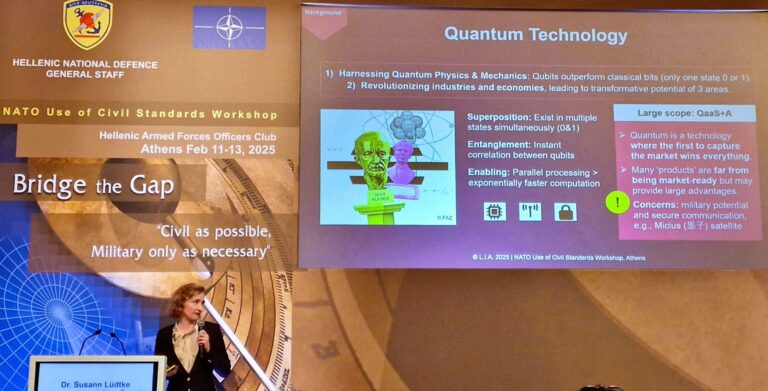Speaker at TDI25: Standards-Setting & Power Politics
Standardization Strategy in a Geopolitical Context – A Wake-Up Call from TDI 2025
What an insightful panel at the 2025 Day of Industry (TDI25), hosted by the Federation of German Industries (BDI)! Under the title “Standards-Setting & Power Politics – The EU in Competition with China and the USA”, experts came together to discuss the role of standardization in the global power landscape. The panel was organized by DIN – German Institute for Standardization and DKE – German Commission for Electrical, Electronic & Information Technologies.
The key takeaway: We must shift from reactive behavior to a proactive, strategically driven standardization policy.
Standardization: From Technical Detail to Geopolitical Key Issue
Standards are no longer mere technicalities—they have become a geopolitical tool. Those who set the standards shape markets, technology pathways, and security protocols. China recognized this early on and has been pursuing an assertive standardization strategy for years, aiming to actively shape international norms.
Europe, by contrast, is still largely “asleep at the wheel”. While technical expertise is abundant, strategic gaps, resource constraints, and lack of institutional anchoring are holding us back.
The Key Questions Raised in the Panel
The discussion brought to light several critical challenges:
- Why are we still acting reactively?
Why haven’t we succeeded in developing a forward-looking standardization strategy—similar to China’s model? - Focusing scarce resources on key technologies:
Why aren’t we concentrating our limited capacities more strategically on technology fields where Germany and Europe still have a leading position? - Closing standardization gaps:
Areas such as quantum communication, high-performance computing (HPC), defense tech, and space tech often lack clearly defined standards—making us vulnerable. - Early participation in TCs (Technical Committees):
Only through early involvement—for example, in drone technologies or nuclear fusion—can we ensure that our innovations become embedded in global standards. - How do we make standardization success visible?
Standardization must move from the “panic room” to the boardroom. We need better communication strategies and a dedicated image campaign for standards.
The Need for Action Is Clear
One thing became particularly clear: Standardization is no longer just an industrial issue. It requires a whole-of-government approach. For sensitive high-tech areas—especially in the dual-use context—a coordinated inter-ministerial effort is urgently needed. In the long term, this topic should even be anchored within the Federal Chancellery.
L.I.A. – Data-Driven Standardization Strategy
I have been researching international standards since 2013. This passion led to the founding of L.I.A. in 2025. Our mission: data-driven analysis to support strategic standardization decisions.
Because when others play hardball, old answers no longer suffice. We need new tools and data-based strategies to succeed in the geopolitical game of standards.
My Conclusion
A standardization shift is long overdue. The clock is ticking. The pain points are obvious—and so are the opportunities. What’s needed now is shared understanding, political commitment, and the courage to break new ground.
Special thanks to my fellow panelists Sibylle Gabler, Kurt D. Bettenhausen, Dr. Thomas Zielke, and Wolfgang Weber for their valuable insights. Sincere gratitude to Johannes Koch and Sibylle Gabler for the invitation, and to Isabelle Körner for expertly moderating such a complex and critical topic.




